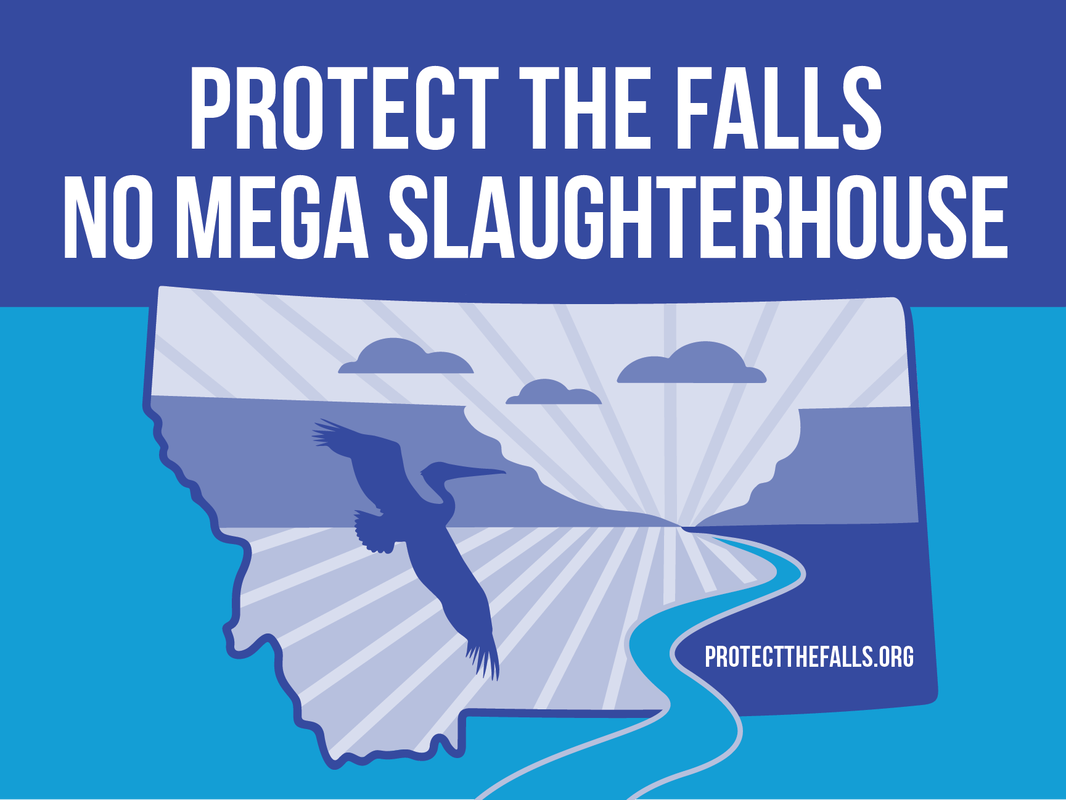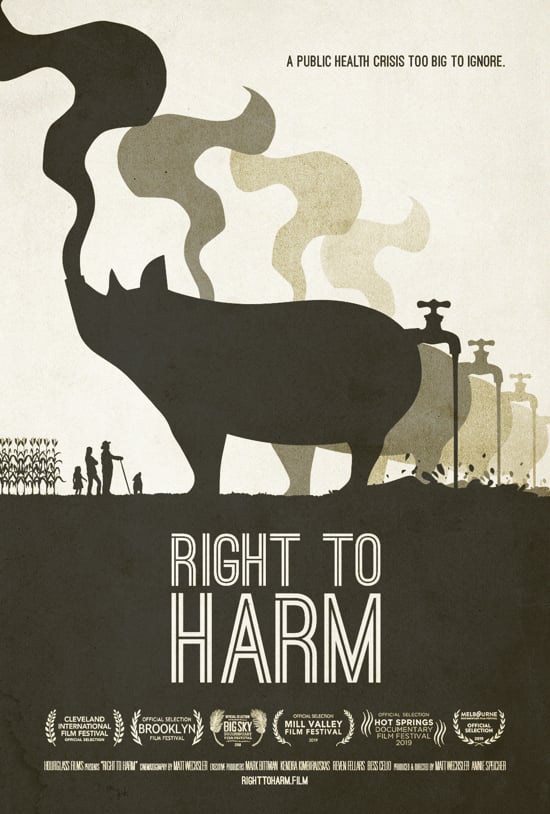|
The Cascade County Zoning Board of Adjustment approved two year extensions for three Madison Food Park projects, not including a renewed/extended of the fourth SUP for the slaughterhouse Read the article in The Electric.
In February, Great Falls Development Authority filed a civil lawsuit in district court over more than $2 million in unpaid loans and placed liens on the Madison Food Park properties east of Great Falls. Read the article in The Electric.
Big Sky Cheese defaulted on their loan with the Great Falls Development Authority this summer. Read the article in The Electric.
Madison Food Park Slaughterhouse Remains a Threat to Community, Clean Water, and Human Health
It’s been several years since the Madison Food Park Slaughterhouse (MFP) was proposed, yet this threat still looms over Great Falls and Cascade County residents, our clean water, and our health. In September, the Cascade County Zoning Board gave MFP’s proponent - Mr. Friesen - a two year extension to the still-pending Special Use Permit application. The silence surrounding MFP does not mean the proposal is dead and we should let our guard down. Rather, everyone who cares about Great Falls’ rich history, way of life, and outdoor recreation should remain vigilant, for our community will be forever changed if it becomes a slaughterhouse town. The MFP Slaughterhouse would be a 3,000-acre industrial-scale facility situated eight miles upstream of Great Falls and just six miles from the city’s drinking water source, the Missouri River. The impacts on the region’s water quantity and quality would be severe, consuming 3.5 million gallons of water from the Madison Aquifer and discharging thousands of gallons of dangerous wastewater each day, threatening pollution to downstream creeks and fisheries, the recreational opportunities they support, and our drinking water supplies. In fact, eight of the twenty largest waterway polluters in the Nation are industrial slaughterhouses. The sheer enormity of waste produced by MFP is also notable. The slaughterhouse would process approximately 132,400 animals weekly, including 9,900 hogs, 2,500 cattle, and 120,000 chickens, resulting in staggering volumes of waste per week. Solid and liquid waste from industrial-scale slaughterhouses produce noxious odors that would significantly degrade air quality and the aesthetics of our downwind Great Falls community. Traditional agriculture and ranching runs deep in Montana, but sadly, MFP would compete against and likely displace small-scale, family-owned farming and ranching with industrial, concentrated feedlots. Instead of inviting corporate take-overs and foreign investors, we should be carrying forth the already-present momentum of mobile slaughterhouses and community-scale butcher shops that connect local producers and supplies. Cascade County citizens should be staunch opponents of MFP as it poses serious health impacts, economic, and social consequences. Increased exposure to viruses, bacteria, and wastes, decreased property values, medical service shortfalls, housing shortages, overcrowded school systems, traffic influx, and road infrastructure deterioration are common issues in slaughterhouse towns across the country. The exciting new small businesses, park refinements, and community updates occurring in Great Falls will be all for nothing if our community becomes home to an industrial-scale slaughterhouse. In short, MFP Slaughterhouse isn’t a good fit for Montana, family-owned agriculture, the Great Falls community, or Cascade County. Last spring, the Great Falls City Commission, joined by the Neighborhood Council of Councils and thousands of community members, expressed these concerns to the Governor’s Office and requested the highest level of scrutiny of MFP, yet no action has been taken. Our top government leaders’ inaction means we must remain vigilant in watching the decisionmaking of our local county officials who have inexplicably kept this dangerous proposal alive. We can, and must, demand a better future for our families, communities, and way of life. Protect the Falls is a diverse coalition of Montanans working to safeguard public health, healthy waterways, clean air, and rural quality of life in the larger Great Falls region from the significant threats posed by the proposed industrial-scale multi-species Madison Food Park Slaughterhouse. Learn more at ProtectTheFalls.org Cascade County approves Permit Extensions for Big Sky Cheese and Silver Falls Distillery The Cascade County Zoning Board of Adjustment approved 24-month extensions of the special use permits for Big Sky Cheese and Silver Falls Distillery, both components of the proposed Madison Food Park project between Great Falls and Belt.
Read the article from The Electric A quick update and reflection on the Madison Food Park from Protect the Falls As 2020 slowly recedes into memory and 2021 kicks off - with big changes at the national, state,
and local levels - the Protect the Falls Coalition wants to share a quick status update on the Madison Food Park Slaughterhouse and reflect on where this issue has been, and what remains in the future. Let’s first recall the issue at-hand. The Madison Food Park slaughterhouse (MFP), first proposed in 2017 as a new “local” business that would allegedly bring new jobs and wealth to Cascade County and Great Falls, has remained a simmering pot of toxic social, environmental, public health, and economic threats to the health and well-being of north-central Montana. The MFP would be over 3,000 acres in size and industrial-scale in its impacts, less than a dozen miles and upstream from Great Falls, generating hundreds of thousands of gallons and thousands of pounds of hazardous liquid and solid waste per day, and consuming approximately 3.5 million gallons of groundwater per day. To be clear, based on facts presented in its 2017 Special Use Permit application to Cascade County, the MFP would constitute the single largest multi-species slaughterhouse in the American West. So too does the MFP slaughterhouse present the high likelihood for increased development of industrial-scale animal feedlot operations in Montana. AKA “Concentrated Animal Feeding Operations,” these huge feedlots have been documented across the nation as creating serious human health and environmental pollution problems, issues that Great Falls and Montana certainly don’t need. The likely rise of CAFOs together with the MFP slaughterhouse paint a tragic picture of industrial-scale agriculture competing with, and probably displacing, Montana’s traditional small-scale grower and family-farmer model and a slow but sure decline in environmental, social, and economic well-being across north-central Montana. It’s important to note now, in January 2021, that the MFP slaughterhouse is not a done-deal, and in fact does not have legal permission to begin construction or operate. The first step in the process for the MFP to actually be built and operate is obtaining a special-use permit (SUP) from Cascade County: you might recall the turbulent and widespread public opposition to the MFP’s initial SUP application in 2017 and 2018. Notably, the MFP’s proponent – Mr. Friesen, a Canadian businessman – voluntarily withdrew the SUP application over two years ago and, since then the application has lapsed, meaning there is no local legal basis or authorization for the MFP slaughterhouse at this time and a new SUP is needed if the MFP is to try to move forward. Citizens should also be aware that any SUP application would require a robust public participation process and thorough vetting at the County level, and so too require several different pollution and water use permits at the state level, all of which also require public participation and high legal standards of care. Sadly, as many know, the lack of a SUP for the slaughterhouse didn’t stop Mr. Friesen and the MFP from switching gears and pushing forward other, allegedly unrelated business ventures on the same property. A cheese-plant and a distillery have both been proposed and, in the case of the cheese-plant, legal battles have been fought over meaningful public and environmental health conditions imposed. After undergoing public hearings with on each of those two entities, the County has reissued a Special Use Permit with conditions for the cheese-plant and has also issued a conditional Special Use Permit for the distillery. Meanwhile, there remains no “new” news on whether Mr. Friesen will again try and push the MFP’s primary slaughterhouse component forward. Because the MFP project threatens so many problems for our community and region the Protect the Falls Coalition continues to work with and support local neighborhood councils in Great Falls in voicing legitimate concerns to local elected officials. Specifically, we supported Great Falls’ neighborhood councils and the Council of Councils in their request to City leaders to study the MFP slaughterhouse before any decision-making. That effort was heard loud and clear by City Commissioners, who agreed the MFP presented more questions than answers, and in response the City of Great Falls passed a unanimous resolution calling on the Governor’s Office to perform an Environmental Impact Study (EIS) of the MFP under our the Montana Environmental Policy Act, all towards providing our decisionmakers with strong science and nonpartisan data on what the MFP slaughterhouse would mean for Great Falls, Cascade County, and north-central Montana. Unfortunately, Gov. Bullock never got the chance to respond to the City of Great Falls’ request with the advent of the CV-19 pandemic. In 2021 the Coalition will work with local leadership to again request new Governor Gianforte task his executive agencies with studying the prospect of a MFP slaughterhouse and what it means for our community, our landscapes, our waterways, and our quality of life, all towards “taking a look before we leap.” So, while there is no “new news” on the MFP slaughterhouse, there is an abundance of facts and data showing the diverse, significant, negative impacts that this project would incite in the larger Great Falls region. Whether enormous environmental degradation to water resources, serious new strain on social services, housing, and road infrastructure, public health concerns related to the dirty trade of industrial slaughterhouse practices, or the likely rise of industrial- scale, polluting feedlot operations to supply the MFP, there remains ample reason for the Protect the Falls Coalition to remain vigilant and committed to ensuring the public knows the truth about the MFP Slaughterhouse. Equally important, the Protect the Falls Coalition remains committed to being a voice for the public interest, bird-dogging the MFP while reminding citizens that the many things Great Falls, much less Cascade County and north-central Montana, honor and value - our outdoors heritage, existing tax base, work force, local businesses, and our traditional agricultural roots – are unnecessarily put at risk should we invite the specter of industrial agriculture into our community and homes. District Court Rejects County’s Revision of Big Sky Cheese Special Permit Conditions On November 06, 2020 Judge Manley ruled in favor of Montanan's for Responsible Land Use in their action against the Commissioners modifying, reversing, and remanding of the ZBOA conditions on the Big Sky Cheese Special Use Permit.
The court determined the Commissioners abused their discretion in modifying, reversing, and remanding the ZBOA's conditions. In granting the Plaintiff's motion the court AFFIRMS the ZBOA's conditions. Read the initial lawsuit. This is a huge win for the citizens and landowners of Cascade County. Our Commissioners are held to the same standards as the District Court and the ZBOA has legislative and zoning regulation authority to impose SUP conditions based on fact! Visit The Electric to read more. Upcoming Cascade County Public Hearing Regarding Zoning Regulations There is a Public Hearing event scheduled for November 12, 2020 via Zoom. This hearing will review revisions to the Cascade County Zoning Regulations, revisions that could very well effect the Madison Food Park Slaughterhouse and the future of our region. We suggest citizens of Cascade County consider attending the hearing or submit a public comment voicing your concerns. The following is a statement from our partners Montanans For Responsible Land Use: Hello Friends and Neighbors, There is a public hearing for the Revised Zoning Regulations on Thursday, November 12 at 5:30 pm via zoom. As you recall we began writing comments about the Revised Zoning Regulations in February 2019. On a vote of 4-3, the Planning Board recommended the following in September 2019.
We agree with the Planning Board recommendation. The current Planning Staff are recommending retention of the MU-40 District. We disagree with the land use changes made in this MU-40 District. 1) MU-40
2) Retain our current Agricultural zoning
3) We object to removing any Special Use Permits for large-scale intensive uses because there are areas in the county that are not appropriate for large-scale uses and that may not be in alignment with our growth policy. Below are a few useful links to help you stay informed and get involved: The public hearing on the Revised Zoning Regulations is on November 12 at 5:30 pm via Zoom Register to attend the hearing via Zoom Public comments may be sent through November 11. However, to have them placed in the Commissioners’ packets for early review they should be submitted by this Friday, November 6th If you would like to submit a Public Comment in anticipation of the hearing, please use the provided form. All public comments, including to the Commissioners, use and submit this form to the Planning Department. The Planning Department then forwards public comments to the Commissioners. You may complete this form online and then email it to planningcomments@cascadecountymt.gov. View November 12th Meeting Agenda View the list of materials provided by Planning Department staff as well as a collection of public comments received regarding the revisions and the revision process of 2019-2020 zoning regulations. Check out this helpful table. This table shows use cases where Special Use Permits (SUPs) are required, providing an opportunity for public comment! Read the recent article in The Electric for a brief rundown of what to expect in the meeting. Cascade County responded last week to the City Commission’s March resolution requesting that the county study the Madison Food Park proposal.
Read the full article at The Electric “Right to Harm,” a new documentary exposing the environmental horrors of factory farms, tells the stories of activists who are standing up to corporate agribusiness. Now, for a limited time (until June 4), you can watch a free streaming of the full “Right to Harm” by clicking on this link. Organic Consumer Association will be hosting a panel discussion June 4th at 7pm.
“Right to Harm” exposes the crippling impact factory farming has on public health, and how mostly rural and low-income communities suffer the most. The film features five families exposed to millions of gallons of untreated waste from neighboring Concentrated Animal Feeding Operations (CAFOs), and how they banded together to demand justice. During our panel discussion, experts will explore the impacts of Big Ag and Big Meat on a range of social justice issues, and how by working together, we can achieve a just transition to Regenerative Agriculture. Panelists will include: • Matt Wechsler, director of “Right to Harm” • John Ikerd, an agricultural economist who is featured in film • Francis Thicke, a regenerative dairy farmer • Ronnie Cummins, co-founder of Organic Consumers Association • Sherri Duggar, Executive Director of the Socially Responsible Agriculture Project • Monica Brooks, Socially Responsible Agricultural Project. Watch the film here (before June 4) Sign up here to join the online panel discussion |
Categories |



